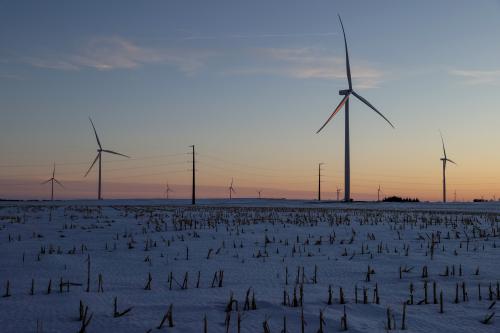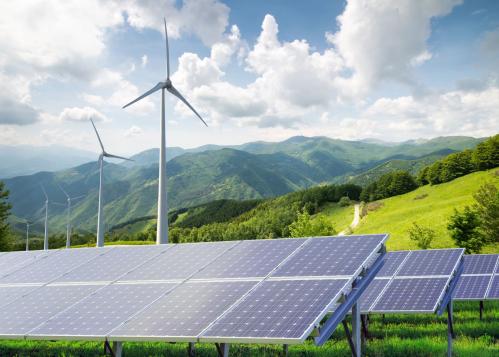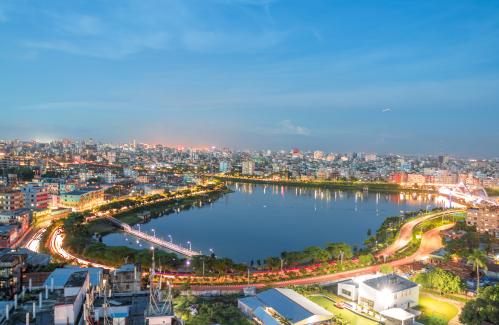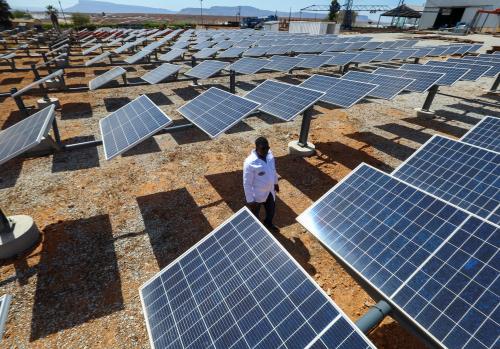This is the third in a series of posts on the future of natural resource governance that builds upon a virtual October 2020 dialogue co-hosted by the Leveraging Transparency to Reduce Corruption project, the Natural Resource Governance Institute, and the Transparency and Accountability Initiative. The first post is here, and the second post is here. The series is intended to spark discussion and thinking around what the field needs to do differently, more of, or better in the years to come—not as a comprehensive summary of the discussion, nor as a fulsome set of action items to be followed. We welcome your thoughts on these and other issues related to the future of natural resource governance on Twitter using #futureofNRG.
The political dimensions of natural resource governance are more prominent than ever. Rising threats to democracy, including surging populism, repression of civil society, and shifts in global power form an intimidating backdrop. This context will affect the levers of change that those seeking to promote effective natural resource governance must use. At the same time, there are opportunities to seize, including a growing global consensus of the imperative to address the climate emergency and state capture, and decolonize development by ending the systemic injustices and racism that plague the extractive sector.
To address these political challenges and capitalize on these opportunities, the natural resource governance community must evolve. We need to deepen and broaden coalitions at the local, national, regional, and international levels. We need to be politically savvier. We need to examine different ways of collaborating; consider merging efforts and institutions; and recognize when it is best to lead, follow the leadership of others, or move beyond the traditional single-leader model.
Confronting geopolitics and state capture
Meeting the twin objectives of defending gains and advancing resilient and sustainable governance of natural resources requires navigating geopolitical realities and political economy considerations. In an environment of intensified competition for natural resources, where gains made on transparency, civic space, and governance standards are under threat, the natural resource governance field must more proactively and effectively engage key geopolitical players. China serves as a case in point. China’s significant demand for natural resources, increasing presence in resource-rich countries, and dominance in the global rare earth minerals market show its prominence and centrality in the global natural resource governance space. Participants at the dialogue identified China as a priority actor for engagement.
Several participants noted that while China has often dominated the conversation (in large part due to its outsized role in global supply chains), those conversations have been about China rather than with China-based stakeholders. Dialogue participants called for adding another, newer dimension to engagement with Chinese standards and with Chinese stakeholders: in particular, more engagement with the Chinese government and company representatives in countries where they are extracting. Participants suggested that adding to the existing mix a new approach encouraging transparency and accountability on reputational or business grounds could be more effective for improving natural resource governance than a normative, moralistic one. Another key shift in perspective is to see the geopolitics from an Asian vantage, not just a US-EU-UK centric lens.
More generally, to appropriately analyze the interaction between corruption risks, political economy, and governance issues, a number of participants emphasized the need to understand and diagnose state capture—a pervasive form of high-level political corruption whose dynamics vary across settings. This may help transparency and accountability activists and reform agents to clearly identify obstacles to economic diversification, energy transition, and effective and equitable public health measures. Moving forward, implementing radical transparency in both industry (including state-owned enterprises) and government regarding natural resources and climate and environmental risks; eliminating tax loopholes, subsidies and bailout handouts for the fossil fuel industry; and advancing political finance reforms and reviewing the role and responsibilities of the U.S. oil majors in international initiatives such as the EITI must be priorities.
Combating repression of civil society
The pandemic has provided ample opportunity for states to abuse COVID-19 related restrictions to ramp up internet surveillance and restrict freedoms of assembly, association, and expression. As a result, many transparency and accountability advocates face increasing safety concerns. Yet, some international NGOs are struggling to maintain access to and political cover for these local actors.
New action within the natural resource governance field is needed to reinforce at-risk actors. While civil society actors often bear the brunt of risks for engaging with government, investors, IFIs, the G7, and G20, there must be a shared responsibility for protecting these activists by calling out bad actors and leveraging the power of investors, states, institutions, and corporations as appropriate. Political support should come from a wide range of groups at both the local and international levels, and from those with the power to influence government behavior.
Growing the coalition and strengthening alliances
COVID-19 has broadened the gap between groups operating on the local level and those functioning on a national or international level. Even before the pandemic, divides between local civil society organizations and national or international NGOs perpetuated the idea that policy discussions are high-level, technical exchanges between public officers and professionalized institutions.
Many participants expressed concern that the natural resource governance community has not done enough to collaborate across strategic vertical alliances within the natural resource governance field and horizontal alliances with other fields and movements. On the former, actors in the field believe that IFIs, local civil society organizations, national and international NGOs, and governments must unite on common objectives and improve information-sharing channels. On the latter, international and national groups must also find ways to engage more effectively with on-the-ground social movements such as those on human rights, gender, taxes, and climate in order to create a lasting change that is informed by and helps meet the needs of locally led, broad-based coalitions. Rather than co-opting those movements, natural resource governance actors should complement broader movements that will have spillover benefits for good governance of natural resources.
Advancing the agenda ahead
Throughout this three-part series, we have highlighted some of the trends, challenges, and opportunities that researchers, activists, and policymakers may examine to reimagine the sector. The call is to be clear and bold. Timid efforts and insufficient focus risk decreasing the effectiveness and credibility of the natural resource governance field.
Join us in this effort—share your ideas for specific collective actions using #futureofNRG and participate in our survey on natural resource governance priorities. The Leveraging Transparency to Reduce Corruption team will be publishing a series of blogs from a variety of voices that further examine these priorities and identify solutions.
-
Acknowledgements and disclosures
The authors would like to thank Julia Bourkland and Sue Ryu for copyediting assistance.
The Brookings Institution is committed to quality, independence, and impact.
We are supported by a diverse array of funders. In line with our values and policies, each Brookings publication represents the sole views of its author(s).











Commentary
Transforming natural resource governance: Break silos, sharpen politics
February 23, 2021